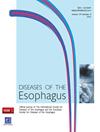264. 85例接受反流阻滞治疗胃食管反流病的患者的回顾性图表回顾:安全性和有效性
IF 2.3
3区 医学
Q3 GASTROENTEROLOGY & HEPATOLOGY
引用次数: 0
摘要
RefluxStop是一种新型的外科设备,通过恢复抗反流屏障的正常结构来治疗胃食管反流病(GERD)。这是通过恢复His的锐角并将胃食管括约肌充分固定在腹腔内来实现的。本研究报告了79例患者术后的安全性和有效性。对2021年7月至2022年11月期间在一家机构接受RefluxStop手术的79名患者进行了回顾性图表审查,以在获得知情同意后控制GERD症状。在随访期间,评估措施的可行性、安全性和临床结果。79名患者(年龄49.8 ± 14岁),其中46人为男性,平均BMI为25.8 ± 4.5注意到的相关疾病包括食管炎(45.6%)、巴雷特食管(17.7%)和裂孔疝(57%)。35%的病例中疝很大,总体平均大小为2.9厘米。基线症状包括一般胃食管反流症状(35.4%)、烧心(29.1%)、咳嗽(13.9%)、反流(11.4%)、胸骨后灼热(10.1%)、声音嘶哑(5.1%)、腹痛或压力(3.8%)、恶心(2.5%)等。GERD健康相关生活质量(GERD-HRQL)基线评分为21.5 ± 5.2,患者接受质子泵抑制剂(PPIs)治疗的平均时间为4.7 ± 6.8年。手术后(10.7 ± 3.1个月),所有受试者GERD相关症状(包括吞咽困难)均有显著改善。只有2.5%的患者需要使用PPIs,没有受试者需要术后食管扩张或再次手术。此外,没有严重的围手术期并发症。术后,GERD-HRQL平均评分显著降低至1.6 ± 3.2(改善92.6%)。这项研究增加了越来越多的证据,证明RefluxStop程序在GERD患者的管理中是安全有效的。值得注意的是,PPI的使用和与健康相关的生活质量参数得到了显著改善。还需要更多的研究来进一步验证这一程序在疾病管理中的作用。本文章由计算机程序翻译,如有差异,请以英文原文为准。
264. A RETROSPECTIVE CHART REVIEW OF 85 PATIENTS UNDERGOING THE REFLUXSTOP PROCEDURE TO MANAGE GASTROESOPHAGEAL REFLUX DISEASE: SAFETY AND EFFICACY
RefluxStop is a novel surgical device that manages gastroesophageal reflux disease (GERD) by restoring the normal structure of the antireflux barrier. This is accomplished by reinstating the acute angle of His and anchoring the gastroesophageal sphincter adequately in the intraabdominal cavity. This study reports the safety and efficacy of 79 patients in the postoperative period.
A retrospective chart review was performed on 79 patients that underwent the RefluxStop procedure at a single institution between July 2021 and November 2022 to manage GERD symptoms after informed consent was obtained. Measures were evaluated to assess the feasibility, safety, and clinical outcomes during the follow-up period.
79 patients (age 49.8 ± 14 years), 46 of which were male, had a mean BMI of 25.8 ± 4.5. Associated conditions noted included esophagitis (45.6%), Barrett’s esophagus (17.7%), and hiatal hernia (57%). Hiatal hernias were large in 35% of cases, with an overall average size of 2.9 cm. Baseline symptoms included general GERD symptoms (35.4%), heartburn (29.1%), cough (13.9%), regurgitation (11.4%), retrosternal burning (10.1%), hoarseness (5.1%), abdominal pain or pressure (3.8%), nausea (2.5%), and others. Baseline GERD health-related quality of life (GERD-HRQL) score was 21.5 ± 5.2 and patients were receiving proton pump inhibitors (PPIs) for a mean of 4.7 ± 6.8 years. After surgery (10.7 ± 3.1 months), all subjects experienced significant improvement in GERD-related symptoms including dysphagia. Only 2.5% of patients required use of PPIs and no subjects required postoperative esophageal dilatation or reoperation. Additionally, there were no severe perioperative complications. Postoperatively, the mean GERD-HRQL score was significantly reduced to 1.6 ± 3.2 (92.6% improvement).
This study adds to a growing body of evidence that the RefluxStop procedure is safe and effective in management of GERD patients. Notably, a considerable improvement in PPI usage and health-related quality of life parameters were appreciated. Additional studies are required to further validate the role of this procedure in disease management.
求助全文
通过发布文献求助,成功后即可免费获取论文全文。
去求助
来源期刊

Diseases of the Esophagus
医学-胃肠肝病学
CiteScore
5.30
自引率
7.70%
发文量
568
审稿时长
6 months
期刊介绍:
Diseases of the Esophagus covers all aspects of the esophagus - etiology, investigation and diagnosis, and both medical and surgical treatment.
 求助内容:
求助内容: 应助结果提醒方式:
应助结果提醒方式:


